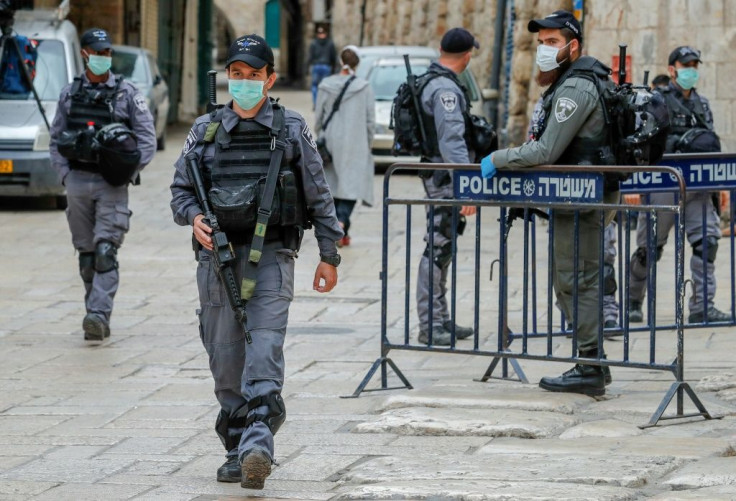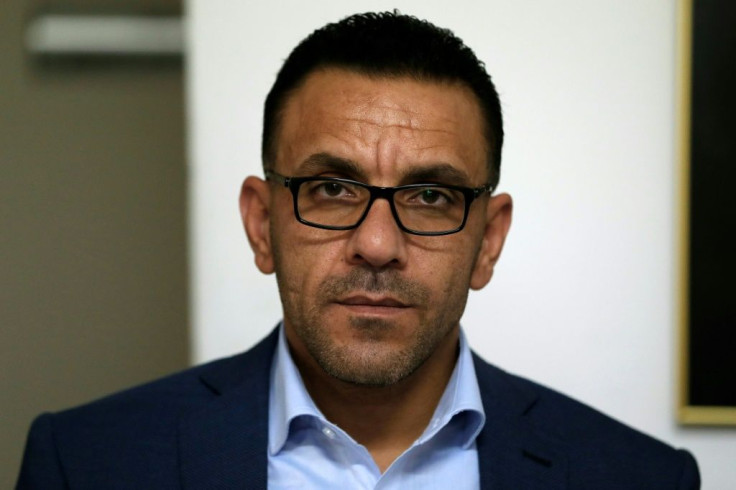Coronavirus Response Stirs Jerusalem Sovereignty Struggle

Israel's arrest of senior Palestinian officials for "illegal" efforts to contain coronavirus and the Jewish state's closure of a clinic have exacerbated a long-running row over the status of east Jerusalem.
Since the onset of the health crisis, Palestinian officials allege the Arab population of Israeli-annexed east Jerusalem has been overlooked by Israeli efforts to curb the spread of the virus.
Israeli police recently shuttered a COVID-19 screening facility in the east Jerusalem neighbourhood of Silwan -- the testing was unauthorised, they said, because it was overseen only by the Palestinian Authority, and not Israel.
"Our goal is to provide aid to the people of east Jerusalem who are intentionally being neglected" by Israel, Fadi al-Hadami, the Palestinian government's minister for Jerusalem affairs, told AFP.
But meetings with "hospital doctors in Jerusalem, interviews with media calling on people to stay at home to fight corona(virus) -- they (Israel) consider these things violations," he complained.
Earlier this month, Hadami and Adnan Ghaith, the Palestinians' governor of Jerusalem, were detained by Israeli authorities amid their on-the-ground response to the coronavirus crisis.
Both men were released within 24 hours. But the spread of COVID-19 in predominantly Palestinian east Jerusalem risks exacerbating political tensions that could put lives at risk.
On Saturday, the Palestinian health ministry reported the first coronavirus death in east Jerusalem, naming the victim as a 78-year-old woman, Nawal Abu Al-Homos. It said that she died in an Israeli hospital in west Jerusalem.
At the heart of the dispute is the status of the city -- one of the thorniest issues in the Israeli-Palestinian conflict.
Israel captured its eastern sector in the Six-Day War of 1967 and later annexed it in a move never recognized by the international community. It views the whole of Jerusalem as its "eternal, indivisible capital" and bans any Palestinian government activity within the city.
The Palestinian Authority considers east Jerusalem the capital of its future state and tries to maintain a presence on the ground.
The city's status was meant to be resolved as part of a final peace agreement between the two sides, but the diplomatic process between Israel and the Palestinians has long been dormant.
Israeli police meanwhile enforce the prohibition on any Palestinian activity in east Jerusalem they deem political.
A total of 81 people have tested positive for coronavirus in east Jerusalem, according to the Palestinian health ministry.

Israel recently doubled the number of its screening centres in Palestinian neighbourhoods of the city from three to six following a petition to the supreme court by a human rights group.
The detention of the senior Palestinian officials this month was nothing new -- Ghaith has been arrested seven times in two years, Hadami four times.
But this time, the men said, they were not asked about political activities but their work spreading awareness about the coronavirus among Palestinians in Jerusalem.
The two men are from Jerusalem, but due to Israeli restrictions they work in Al-Ram, on the other side of an Israeli wall separating the city and the occupied West Bank.
"If I walk in the street the Israelis consider it political because of my position," Hadami said.
Ghaith said Israel would continue such arrests "until it is cemented in peoples' minds that the city is subject to its authority" alone.
Since 2001, the height of the second Palestinian uprising, Israel has closed more than 80 Palestinian institutions in Jerusalem, he said.
And since the US broke with decades of diplomacy and international consensus by recognising Jerusalem as Israel's capital in December 2017, the Jewish state has "escalated the pace of its activity", he added.
Israel prevents "any visibility of Palestinians in Jerusalem or activity of any kind."
For Amal Jamal, a political scientist at Tel Aviv University, "on the one hand, Israel neglects the Palestinian part of the city and does not invest in it.
"On the other, it wants loyalty from the Palestinian population."
Jerusalem Mayor Moshe Lion meanwhile welcomed the opening of the new clinics in the city's eastern sector.
A spokesman for Prime Minister Benjamin Netanyahu noted Israel was supplying equipment and training to the Palestinian Authority to help deal with the crisis.
The latest tensions have not so far erupted into violence in east Jerusalem.
But the police have enforced coronavirus restrictions against recalcitrant ultra-Orthodox Jews in west Jerusalem's Mea Shearim neighbourhood, one of the epicentres of the outbreak.
Three officers were wounded in clashes on Thursday when enforcing orders to keep synagogues closed.
© Copyright AFP 2024. All rights reserved.





















